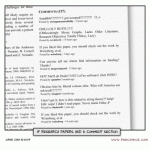open science
A post from December 5, 2007:
Communication
Communication of any kind, including communication of empirical information about the world (which includes scientific information), is constrained by three factors: technology, social factors, and, as a special case of social factors - official conventions. The term "constrained" I used above has two meanings - one negative, one positive. In a negative meaning, a constraint imposes limits and makes certain directions less likely, more difficult or impossible. In its positive meaning, constraint means that some directions are easy and obvious and…
What does it mean - a Journal Club? Read here and, if you want to do one, contact me.
As the boundaries between formal and informal scientific communication is blurring - think of pre-print sites, Open Notebook Science and blogs, for starters - the issue of what is citable and how it should be cited is becoming more and more prominent.
There is a very interesting discussion on this topic in the comments section at the Sauropod Vertebra Picture of the Week blog, discussing the place of science blogs in the new communication ecosystem and if a blog post can be and should be cited. What counts as a "real publication"? Is the use of the phrase "real publication" in itself…
When I go to the Lindau Nobel meeting in Germany in a few weeks, I will not only report from there as a blogger. I was also asked to participate on a panel about Open Access publishing:
"Beatrice Lugger, German science journalist (and founder of Scienceblogs Germany), will moderate this panel. The panelists are: Nobel Laureates Aaron Ciechanover and Sir Harold Kroto, Bora Zivkovic of PLoS, and Dr Jason Wilde, publisher for the physical sciences at Nature Publishing Group."
David Dooling has a great post that starts with the conference blogging issue, and then leaps off in a different but related direction - the curious double standard in the data release policies applying to large genome sequencing centres compared to other genomic researchers.
As David notes, the advent of second-generation sequencing technologies means that medium-size genomics labs can now generate more sequence in a month than the entire Human Genome Project was able to generate in a year; indeed, a single Illumina Genome Analyzer can now produce a high-quality entire human genome sequence…
As you may have noticed if you saw this or you follow me on Twitter/FriendFeed/Facebook, I spent half of Tuesday and all of Wednesday at the XXVI International Association of Science Parks World Conference on Science & Technology Parks in Raleigh. The meeting was actually longer (starting on Sunday and ending today), but I was part of a team and we divided up our online coverage the best we could do.
Christopher Perrien assembled a team (including his son) to present (and represent) Science In The Triangle, the new local initiative. They manned a booth at which they not only showcased…
You may have noticed a couple of days ago that Caryn Shechtman posted an interview with me on the New York blog on Nature Network. Then, Caryn and Erin and I thought it might be a good idea to have the entire interview reposted here, for those who missed it. So, proceed under the fold:
1. What is your professional background?
Even as a little kid I always loved animals and thought that whatever I do when I grow up would have something to do with animals: perhaps work at a zoo or in a circus!. When I was in 6th grade or so, I read the entire series of books by James Herriot and decided to…
You have proven your fitness, evolutionarily speaking, not when you have babies, but when your babies have babies. So I am very excited that my babies - the three science blogging conferences here in the Triangle so far - have spawned their own offspring. Not once, but twice. The London franchise will happen again this year. And just like we changed the name from Science Blogging Conference into ScienceOnline, so did they.
Science Online London 2009 will take place on Saturday August 22, 2009 at the Royal Institution of Great Britain in London, co-hosted by Nature Network, Mendeley and the…
It appears that Jorge Cham has been reading some of these posts or associated FriendFeed threads, because today's PhDcomics strip is this one:
I am wondering how many of 'weissberg's' comments have been removed by the moderators over the years.
Also, if duplicate comments are posted 14 years apart, is it because MoveableType stalled that long? Do they even count as duplicates any more?
And why did the reviewer take so long to post the review? And how does one get scooped by a 14-year old paper? Just the lack of habit of reading historical literature?
Task: identify the paper this is…
Last week also demonstrated another benefit of Open Access. Not just that everyone could re-use the images from the Ida paper without wondering "is this too much for Fair Use principles?" (yes, I have seen people re-post every single image from the paper into their articles/posts, plus lengthy excerpts of text), but people could do fun stuff to them as well, and even use it for commercial endeavors.
And I am not talking just about the Google logo last Wednesday!
First to make a creative reuse of an article image was Ed Yong in his brilliant and hilariously funny post Darwinius changes…
Pete Binfield, the Managing Editor of PLoS ONE, presented a webinar about article-level metrics to NISO - see also the blog post about it:
Article-Level Metrics (at PLoS and beyond)
Tags: PLoS PLoS ONE PLoSONE ONE Journal articlelevelmetrics article level metrics binfield COUNTER onlineusage usage academicjournals academic journals journals library Public Library of Science science citations openaccess OA
There have been quite a few posts over the last few days about commenting, in particular about posting comments, notes and ratings on scientific papers. But this also related to commenting on blogs and social networks, commenting on newspaper online articles, the question of moderation vs. non-moderation, and the question of anonymity vs. pseudonymity vs. RL identity.
You may want to re-visit this old thread first, for introduction on commenting on blogs.
How a 1995 court case kept the newspaper industry from competing online by Robert Niles goes back into history to explain why the comments…
Last year in May, when I visited Belgrade, I gave interviews with Radio Belgrade, talking about science publishing, Open Access, science communication and science blogging. The podcasts of these interviews - yes, they are in Serbian! - are now up:
Part 1
Part 2
I know that this blog has some ex-Yugoslavs in its regular audience, people who can understand the language. I hope you enjoy the interviews and spread the word if you like them.
Now that we have a real librarian on board, perhaps this is the perfect timing to post these two videos:
Hat-tip to CogSci Librarian who is right now live-tweeting her drive down to North Carolina.
A special issue of JCOM, Journal of Science Communication, has just issued a call for submissions, with the deadline moved to June 1st, 2009:
Science is increasingly being produced, discussed and deliberated with cooperative tools by web users and without the institutionalized presence of scientists. "Popular science" or "Citizen science" are two of the traditional ways of defining science grassroots produced outside the walls of laboratories. But the internet has changed the way of collecting and organising the knowledge produced by people - peers - who do not belong to the established…
One by one, brave people are opening up science, serving as examples of how things can and should be done openly with no ill consequences.
Today - examples of two such pioneers.
First, Bryan Perkins published his research on his blog. Go and read it and post comments, ask questions, help him improve the work. If the feedback is good, who knows, he may submit it to a peer-reviewed journal. In any case, it is much better for data to be out in the open, available to anyone who knows how to use Google search, than gathering dust in some manila folder.
Second, Darren Begley, a graduate student at…
Check them out here (unfortunately, no embed codes, so you'll have to click and watch there, or download on iTunes):
Know Your Rights: Who Really Owns Your Scholarly Works?:
In this panel discussion, experts on copyright law and scholarly publishing discuss how scholars and researchers can take full advantage of opportunities afforded by digital technology in today's legal environment, and suggest ways to advocate for positive change. The panelists are Heather Joseph, who has been Executive Director of the Scholarly Publishing and Academic Resources Coalition (SPARC); Michael Carroll,…
We had a great discussion in the comments yesterday after I published my NJ trees from some of the flu sequences.
If I list all the wonderful pieces of advice that readers shared, I wouldn't have any time to do the searches, but there are a few that I want to mention before getting down to work and posting my BLAST results.
Here were some of the great suggestions and pieces of advice;
1. Do a BLAST search. Right! I can't believe I didn't do that first thing, I think the trees I got surprised me so much all sense flew out of my brain.
2. Show us the multiple alignments. Okay. I'll…
I know it's been a couple of months now since the ScienceOnline'09 and I have reviewed only a couple of sessions I myself attended and did not do the others. I don't know if I will ever make it to reviewing them one by one, but other people's reviews on them are under the fold here. For my previous reviews of individual sessions, see this, this, this, this and this.
What I'd like to do today is pick up on a vibe I felt throughout the meeting. And that is the question of Power. The word has a number of dictionary meanings, but they are all related. I'll try to relate them here and hope you…


